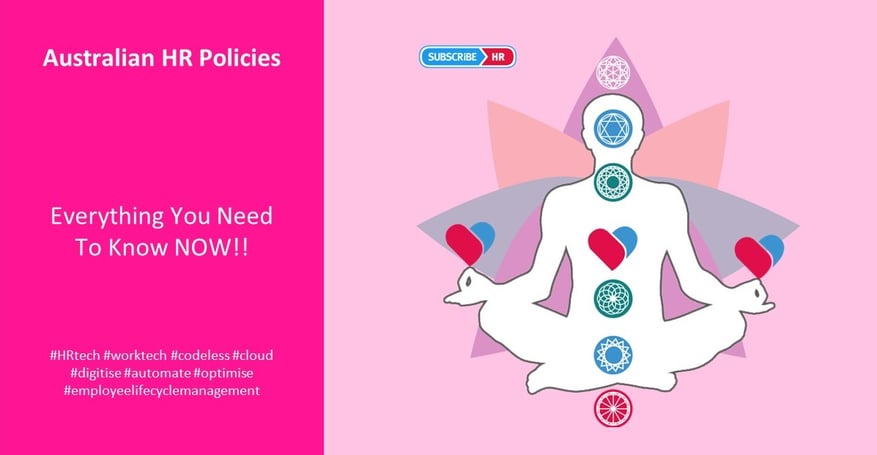We all know that HR policies play a crucial role in any organisation, serving as guidelines and procedures that govern various aspects of employee behaviour and management. These policies provide a framework for consistent decision-making, ensuring fair treatment of employees and aligning their actions with organisational goals.
In Australia, it is vital for organisations to align their HR policies with the country's employment laws and regulations to promote a positive work environment and maintain legal compliance.
Australian employment laws, such as the Fair Work Act, anti-discrimination laws, and workplace health and safety regulations, set the standards for fair and ethical treatment of employees. Organisations that fail to comply with these laws not only face legal consequences but also risk damaging their reputation and losing valuable talent.
So, without further ado, let’s find out everything there is to know about Australian HR policies. ⬇️

Australian HR Policies: a Brief Overview
What are HR policies?
HR policies are guidelines and procedures established by an organisation to govern various aspects of employee behaviour and management. They provide clarity on expectations, rights, and responsibilities within the workplace.
These policies cover areas such as recruitment, employee performance, professional development, leave entitlements, workplace health and safety, and ethical conduct.
What role do HR policies play?
HR policies serve as a roadmap for employees and managers, providing a consistent framework for decision-making. They ensure fair treatment by establishing guidelines that prevent bias and promote equity. This fosters a positive work environment, boosts morale, and increases job satisfaction. 👍
Aligning HR policies with employment laws helps mitigate legal risks and protect the organisation's reputation. Non-compliance can lead to financial penalties, legal disputes, and reputational damage. Conversely, compliance shows ethical practices, attracting top talent and building trust among employees and stakeholders.
How important are HR policies in an organisation?
HR policies are crucial in organisations for several reasons:
-
Positive work environment: HR policies establish guidelines for acceptable behaviour, fostering a positive work environment. They promote respect, collaboration, and trust among employees.
-
Alignment with organisational goals: These policies ensure that employee actions align with organisational objectives and help employees contribute effectively to the organisation's success.
-
Transparency and accountability: HR policies promote transparency by clearly communicating expectations, procedures, and reporting mechanisms. They hold employees accountable for their actions and create a culture of openness.
-
Ethical conduct: HR policies outline guidelines for ethical behaviour and compliance with laws. They set expectations for integrity, promoting a workplace culture that values responsible and ethical decision-making.
-
Risk mitigation: HR policies help ensure compliance and protect the organisation's reputation.
Understanding Employment Laws and Regulations
Fair Work Act and National Employment Standards (NES)
The Fair Work Act is the primary legislation governing employment relationships in Australia. It establishes the National Employment Standards (NES), which outline minimum entitlements for employees.
These include maximum working hours, leave entitlements (such as annual leave and personal/carer's leave), and redundancy pay. Compliance with the NES is essential to ensure fair treatment of employees.
Anti-Discrimination Laws
Australia has comprehensive anti-discrimination laws that prohibit discrimination based on protected characteristics, including race, gender, age, disability, and more.
Employers must develop HR policies that promote equal employment opportunities, prevent discrimination, and address any complaints or issues promptly. Non-compliance with anti-discrimination laws can lead to legal consequences and reputational damage.

Workplace Health and Safety (WHS) Regulations
Organisations in Australia have a legal obligation to provide a safe and healthy work environment. Workplace Health and Safety regulations set out guidelines for hazard identification, risk assessment, incident reporting, emergency preparedness, and more. Developing and implementing robust WHS policies is crucial to ensure the well-being of employees and avoid potential legal liabilities.
Legal Obligations and Responsibilities
Employers have various legal obligations and responsibilities related to HR policies. These include providing fair and safe working conditions, ensuring compliance with employment laws, preventing discrimination and harassment, maintaining accurate employee records, and respecting privacy laws. Understanding these obligations is essential for developing effective HR policies that meet legal requirements. ✔️
Risks and Consequences of Non-Compliance
Non-compliance with employment laws and regulations can have tough consequences for organisations. They could face legal liabilities, financial penalties, and damage to their reputation. Additionally, non-compliant HR policies can lead to employee grievances, loss of employee trust, and difficulty attracting and retaining top talent.
💡 Quick tip: To mitigate these risks and ensure compliance, organisations should regularly review and update their HR policies to reflect changes in employment laws and regulations. Seeking legal advice or consulting with HR professionals can help organisations develop policies that align with legal requirements while promoting a positive and legally compliant work environment.
Every Important Australian HR Policy You Should Know
Minimum Employment Standards
The NES (National Employment Standards)
The NES (National Employment Standards) establishes the minimum employment standards that apply to most employees in Australia. It encompasses key components such as maximum weekly working hours, annual leave entitlements, personal/carer's leave, parental leave, and redundancy pay. These standards ensure fair treatment and provide essential benefits to employees.
Modern Awards
Modern awards play a crucial role in setting minimum employment conditions for specific industries and occupations. They outline provisions such as minimum wages, penalty rates, and allowances. Adhering to modern awards ensures that employees receive fair compensation and entitlements based on their industry or occupation.
Enterprise Agreements
Enterprise agreements allow organisations to establish customised employment conditions that can exceed the minimum standards set by the NES or modern awards. These agreements are negotiated between employers and employees or their representatives. They provide flexibility in tailoring employment conditions to specific organisational needs while complying with legal requirements.
Workplace Health and Safety Policies
Workplace health and safety policies are of paramount importance in ensuring the safety and well-being of employees. They contribute to creating a safe work environment by preventing workplace accidents, injuries, and illnesses. Employers have legal obligations to provide a safe working environment as mandated by Australian workplace health and safety laws and regulations.
Hazard Identification and Risk Assessment
Systematically identifying workplace hazards and assessing associated risks is crucial for maintaining a safe work environment. Policies for hazard identification and risk assessment outline components such as regular inspections, employee involvement, and documentation.
Incident Reporting and Investigation
Incident reporting policies play a significant role in promoting a culture of reporting and learning from workplace incidents. These policies define procedures for reporting incidents, emphasising the importance of timely reporting, thorough investigation processes, and implementing corrective actions. Reporting and investigating incidents help prevent future occurrences and improve workplace safety.
Emergency Preparedness and Response
Having policies that outline emergency preparedness and response protocols is crucial for ensuring employee safety during critical situations. These policies include components such as emergency evacuation procedures, communication protocols, and provisions for first aid. Being prepared and having well-defined response procedures can minimise harm and ensure a swift and organised response to emergencies.
Personal Protective Equipment (PPE)
Policies addressing the use, maintenance, and proper selection of personal protective equipment are essential for employee safety. These policies emphasise training and awareness to ensure compliance with PPE requirements. Providing employees with the necessary protective equipment and educating them on its proper use helps prevent workplace injuries and illnesses.

Anti-Discrimination and Equal Employment Opportunity Policies
Anti-discrimination and equal employment opportunity policies foster a workplace culture that values fairness and equal treatment for all employees. They contribute to creating an inclusive and diverse work environment while ensuring compliance with Australian anti-discrimination laws and regulations. These policies enhance an organisation's reputation as an inclusive and socially responsible employer, attracting and retaining top talent.
Protected Characteristics and Guidelines for Preventing Discrimination
In the workplace, it is crucial to foster an environment that values fairness, equality, and respect for all employees. Anti-discrimination laws outline various protected characteristics that should be recognised and protected against any form of discrimination.
Anti-discrimination laws typically identify several protected characteristics that individuals possess and should be safeguarded against discrimination. These characteristics include:
-
Race: Refers to a person's race or ethnic background.
-
Colour: Relates to a person's skin colour or complexion.
-
National or Ethnic Origin: Pertains to a person's nationality or ethnic heritage.
-
Sex: Represents a person's biological sex, typically categorised as male or female.
-
Pregnancy: Includes protection against discrimination based on pregnancy, childbirth, or related medical conditions.
-
Sexual Orientation: Encompasses a person's sexual attraction and orientation, such as being heterosexual, homosexual, or bisexual.
-
Gender Identity: Refers to an individual's deeply-felt sense of their own gender, which may not necessarily align with the sex assigned at birth.
-
Age: Protects individuals from discrimination based on their age, ensuring equal opportunities regardless of age.
-
Disability: Covers individuals with physical or mental impairments, providing protection against discrimination and promoting accessibility.
-
Religion: Includes protection against discrimination based on religious beliefs, practices, or affiliations.
Discrimination based on these protected characteristics is prohibited by law, and employers have a responsibility to actively prevent and address any instances of discrimination within the workplace. It is essential to create a work environment where employees are treated fairly, regardless of their protected characteristics.
Guidelines for Preventing Discrimination
To prevent discrimination, organisations should establish and promote guidelines that emphasise equal treatment and respect for all employees. Here are some key guidelines:
-
Equal Treatment: Emphasise the importance of treating all employees fairly and consistently, regardless of their protected characteristics. Every individual should have equal access to employment opportunities, benefits, and career advancement.
-
Recruitment and Selection: Ensure fair and unbiased hiring practices, including job advertisements, application processes, and selection criteria. Avoid any discrimination during the recruitment and selection process.
-
Equal Pay: Highlight the importance of ensuring equal pay for work of equal value, irrespective of protected characteristics. Eliminate gender or other forms of pay gaps within the organisation.
-
Workplace Harassment: Establish policies and procedures to prevent harassment based on protected characteristics, including sexual harassment, racial harassment, and bullying. Provide a safe and respectful work environment for all employees.
-
Reasonable Accommodations: Explain the obligation to provide reasonable accommodations for employees with disabilities or other protected characteristics to ensure equal employment opportunities. Make necessary adjustments to support their participation and advancement in the workplace.
-
Training and Awareness: Emphasise the value of training programs to educate employees about anti-discrimination policies, raise awareness of unconscious biases, and promote respectful workplace behaviours. Encourage a culture of inclusivity and diversity.
Code of Conduct and Ethics Policies

A code of conduct and ethics policies establish a set of ethical standards and expectations for employees within an organisation. They guide employee behaviour, promote integrity, and ensure ethical decision-making. These policies shape the organisational culture, fostering values such as honesty, respect, and accountability. They also help organisations comply with relevant laws, regulations, and industry standards.
Integrity
Integrity is a fundamental value upheld by a code of conduct and ethics policies. It emphasises the importance of honesty, transparency, and ethical behaviour in all aspects of work. Employees are expected to act with integrity, maintain high moral standards and demonstrate honesty in their interactions with colleagues, clients, and stakeholders.
Confidentiality and Data Privacy
Confidentiality and data privacy are significant considerations in today's digital world. A code of conduct and ethics policies typically outline the importance of respecting and safeguarding sensitive information. Employees are expected to maintain confidentiality regarding proprietary data, customer information, and any other confidential or personal data they encounter during their work. This includes adhering to data protection laws and regulations to ensure the privacy and security of individuals' data.
Respect and Non-Discrimination
Respect and non-discrimination are fundamental principles that contribute to a positive and inclusive work environment. A code of conduct and ethics policies emphasise the importance of treating all individuals with respect, regardless of their background, protected characteristics, or personal beliefs. Discrimination, harassment, or any form of disrespectful behaviour based on race, gender, religion, sexual orientation, or any other protected characteristic is strictly prohibited.
Compliance with Laws and Regulations
Organisations operate within a legal framework, and compliance with laws and regulations is essential. A code of conduct and ethics policies emphasises the obligation of employees to adhere to applicable laws and regulations governing their work. This includes compliance with industry-specific regulations, labour laws, anti-corruption laws, and any other legal requirements relevant to the organisation's operations.
Conflict of Interest
Managing conflicts of interest is another critical aspect addressed by a code of conduct and ethics policies. Employees are expected to identify and disclose any conflicts of interest that may arise between their personal interests and the interests of the organisation. This ensures transparency and integrity in decision-making processes, safeguarding the organisation's reputation and preventing any potential harm.
Leave and Attendance Policies
Leave and attendance policies cover various types of leave entitlements for employees in Australia. These policies include:
-
Annual Leave: Paid leave entitlements for employees, specifying accrual, usage, and payment provisions.
-
Sick Leave: Paid leave for employees facing personal illness, outlining criteria, documentation requirements, and limitations.
-
Personal/Carer's Leave: Leave for attending to personal illness, caring responsibilities, or emergencies, with conditions, usage limitations, and documentation requirements.
-
Parental Leave: Entitlements for both maternity and paternity leave, including duration, eligibility criteria, and benefits.
-
Long Service Leave: Additional leave benefit based on length of service with an employer, with qualifying periods, accrual rates, and conditions for taking leave.
Performance Management Policies
Productivity and Performance Improvement
Performance management policies contribute to employee development and growth. They provide a framework for setting performance expectations, identifying areas for improvement, and supporting employees in their professional development.
These policies play a pivotal role in facilitating the recognition and reward of high-performing employees within an organisation. These policies are designed to motivate employees, drive productivity, and foster a positive work environment.
Performance management policies establish a structured framework for identifying and acknowledging the efforts and achievements of high-performing employees.
Recognition and Rewards

Recognition and rewards are powerful motivators for employees. When employees' hard work and contributions are acknowledged and rewarded, it creates a sense of achievement, pride, and job satisfaction. This recognition reinforces positive behaviours and encourages employees to continue performing at their best, driving overall productivity and performance within the organisation. 👍
Fair and transparent performance evaluation processes are essential for fostering a positive work environment. When employees perceive that their performance evaluations are conducted objectively and without bias, it instils trust and confidence in the organisation's practices. This transparency creates a supportive culture where employees feel valued, leading to higher employee engagement, morale, and job satisfaction.
Performance management policies that emphasise fairness and transparency in recognition and rewards help prevent favouritism or bias. Employees can trust that their efforts will be evaluated based on objective criteria, creating a level playing field for everyone. Fairness and equity in recognition and rewards also promote a harmonious work environment, minimising potential conflicts and fostering positive relationships among team members.
Organisations that prioritise fair and transparent recognition and rewards policies often enjoy higher employee retention rates. When employees feel recognized and valued for their contributions, they are more likely to remain committed to the organisation. Additionally, a positive work environment created through effective recognition and rewards policies can attract top talent, as job seekers seek employers that prioritise employee appreciation and well-being.
Takeaway
In this article, we covered various essential HR policy areas, including workplace health and safety, anti-discrimination, code of conduct and ethics, leave and attendance, and performance management.
These policies help create a work environment that values compliance with the law and prioritises the needs and rights of employees.
Developing customised HR policies, clearly communicating them to employees, and providing training are essential steps to ensure understanding and compliance. Regularly reviewing and updating HR policies is equally important to reflect changes in laws, industry standards, and organisational needs, facilitating continuous improvement and adaptation. ✅

